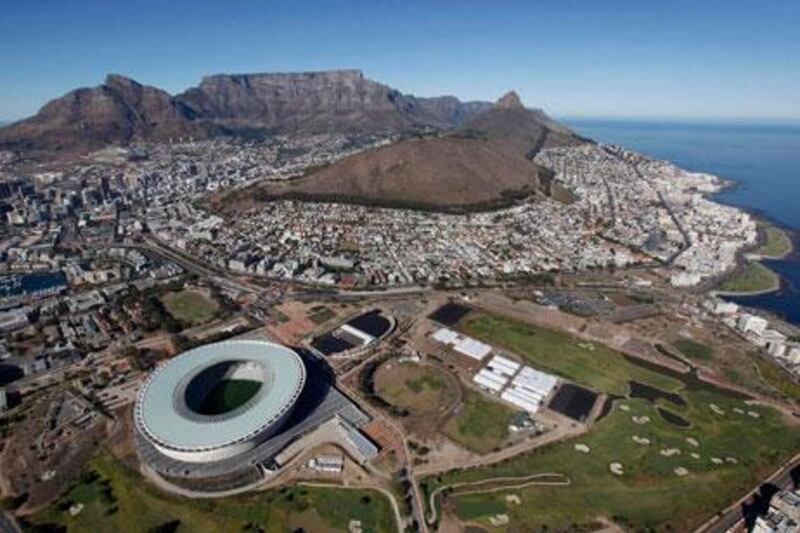Well, if it isn't another Summer OIympic year, here already with the forecast calling for commotion, emotion and, of course, promotion.
London gets to try to outdo Beijing and itself, even if nobody will ever outdo Sydney or Barcelona, and even if we all might wonder when everybody will stop with all this outdoing.
Could London 2012 not prove perfect for debating whether these beyond-grandiose events justify the trouble? When will humanity decide it has seen enough lavish ways of lighting torches?
For a long time, I thought cities or countries staging Olympics or World Cups camped in two categories. There were those desperate to prove themselves to the world, and those with a self-image between healthy and haughty, reckoning they had proved just about enough already.
For the former category, view Barcelona 1992 and Sydney 2000, the former emerging from a terrible historical period, the latter rife with a passage we visitors learnt as "cultural cringe", some strange feeling of not measuring up.
When those two magical Olympics concluded, if you stuck around, you could read for days and weeks a barrage of spot-on commentaries warranting one general headline: "Can You Believe They Love Us?"
(Note: Yes we do, both of you, madly.)
In that wide group, you might toss in Germany for its World Cup of 2006, an event Germans cherish in memory as a time when flags flew again in its remade, 21st-century, impressively cosmopolitan self.
You could fling Beijing 2008 into this group for different reasons, and you can book a reservation for Qatar 2022.
When Brazil won the Olympics for 2016, its adored president Lula cried at the news conference, a beacon of appreciation for fresh inclusion in the global neighbourhood.
If Tony Blair cried at the news conference in Singapore in 2005, I missed it.
In the latter category, I would place Los Angeles 1984 or Atlanta 1996 or Athens 2004, or France's World Cup of 1998. All those events had their charms and idiosyncrasies and values, but lacked the galvanised urgency of the debutante.
London, of course, belongs here.
Recent weeks in South Africa, however, have taught me of a third and most compelling category.
In this sector so rare it might include only South Africa by now, the host country has something to prove to the world but, more curiously, to itself.
South Africa certainly aced the former part, hushing those who sneered over impending violence, but the utmost treasure of the 2010 World Cup might stem from the latter. Ask South Africans - as I did constantly - if the World Cup changed the country, and the leading answer comes sometimes in a bark: "No!"
Some doubters add that it saddled the place with excess stadiums.
True, the Cape Town skyline now includes Cape Town Stadium, which at certain angles appears as if some other kind of structure.
The oddball venue's World Cup moments included Diego Maradona's thumped exit as Argentina manager and the scoreless draw between England and Algeria (after which the facility should have been dismantled immediately to erase all traces of the ghastly memory).
These days, it holds concerts and less-attended home matches for the local football club, Ajax Cape Town.
Still, another group of South Africans speak of a pricelessness. One government official in a casual conversation credited the World Cup with doing something sport does best: lending cohesion, especially to a populace so profoundly fragmented. The most memorable sentiment, though, came from a tour guide extraordinaire named Craig, who was shepherding a busload around Robben Island, most famous for imprisoning Nelson Mandela.
Surprisingly his intricate descriptions found their way to the World Cup after he described the bygone apartheid government and its knack for fostering interracial mistrust. Such systematic destruction would take generations to repair, he said. Yet he also claimed to speak to us from the "lucky generation", the South Africans whose young lives happened to coincide with the sweeping change, the Mandela presidency, the aftermath.
Within that frame came the World Cup, which he extolled because South Africans finally viewed each other just as South Africans, rallying behind Bafana Bafana while unconcerned they would never survive the group stage.
That intangible bit of wonder seems invaluable, and when people see no value, he said, they often think mainly of incomes, a vein in which these big events do get dubious.
London, in turn, will have a gargantuan party with some real east London meaning.
It's just that when this Olympic year finishes with its Olympics, the ensuing discussion might prove more compelling given all the costs and debts and strains in a hardening world.
Was it worthwhile?





